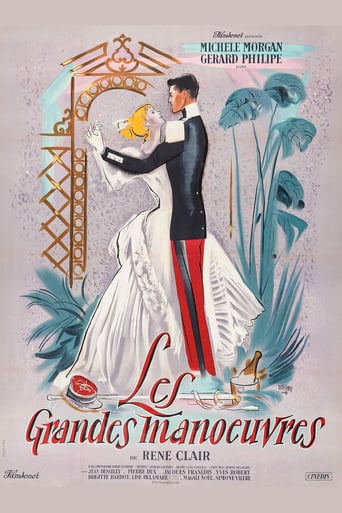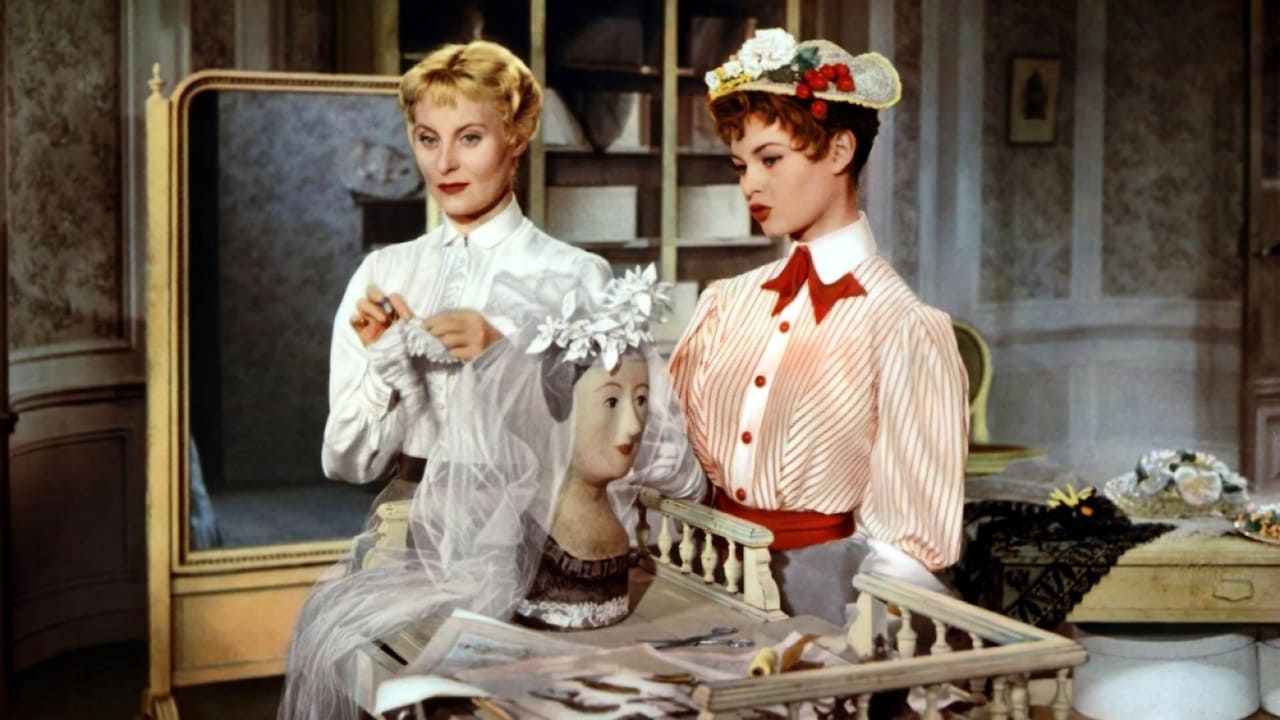jackasstrange
I admit, I was not very big in this film for the most part of it. But hey, is very good from a visual standpoint. We have very unexpected angles and a weird set of lights. Look at how messy the lights are in this film. It helps even more to put focus in the characters. In fact, it alone put a focus in the characters, because they become darken than the set's natural light. And the plot is kinda ugh, you know what I mean? Very cliché. Sure, back in 1955, this kind of 'Guy wants to date girl because of bet with friend" must have been interesting and very original, but nowadays? Not very much, if you ask me. Maybe this is the film that started all these clichés? Well, I don't know, further research is welcomed. But anyway, the editing, the transition of scenes is very crazy, and certainly a very good technique aesthetically talking. This technique alone can change completely the film's ambient.Is kinda interesting and even funny at times, but yeah, for the most part there is nothing that you already haven't seen before made much better than in this film.
Terrell-4
Is it possible to hurt those who are incorrigibly superficial? Probably. In René Clair's Les Grandes Manoeuvres, an amusing film of manners, morals and seduction, you can watch how to do it in style. Lieutenant Armand de la Verne (Gerard Philipe) is a dashing young officer of the 33rd Dragoons. His regiment is based in a small provincial French town. The time is well before World War I. de la Verne has a reputation of having seduced just about every daughter, wife and mistress among the town's grande bourgeoisie and petit nobility, not to mention their maids and a number of night club singers. He's charming, confident, light-hearted and may even mean some of those endearments and pledges he whispers, at least when he's whispering them. His regiment will be going on maneuvers in 30 days, and a wager is placed between his friends in the regiment and their civilian friends. A woman will be chosen at random, and if Armand has not seduced her before the regiment leaves, he and his friends will pay for a sumptuous farewell dinner. If he succeeds, their friends will pay. Armand is supremely confident. So are his friends. The woman turns out to be Marie-Louise Riviere (Michelle Morgan), single, divorced and the proprietor of a millinery shop. The women of the town have been polite toward her but suspicious. She is, after all, an outsider and divorced. A reputation can be extraordinarily fragile when upper-class gossips start whispering together. Not only does Lt. de la Verne begin finding reasons to be gallant toward Madame Riviere, so does Victor Duverger (Jean Desailly), a cautious citizen of the town who is just as worried about his own reputation. He has two sisters who don't approve. Marie-Louise has no wish to see her reputation ruined, despite all those who are observing and who love to have something to talk about behind their fans. Then, to Armand's befuddlement, in the process of seduction he begins to fall in love. By then, everyone is aware of his attempts with Marie- Louise, and all his well-worn (and previously successful lines) are repeated with laughter by his friends, by the women he has seduced and in some cases even by those he didn't. Marie- Louise hears the whispers...even worse, she learns of the wager. This movie which is so stylish, which glows and smiles with such elegant artificiality, has a decidedly ironic ending. The movie is permeated with a gorgeous sense of unreality. The costumes and colors are vibrant; the scenes in the town streets, the drawing rooms, the ball rooms are almost like exquisite drawings. The officers strut along in their red pants, polished black boots and stiff collars. It's apparent that to be a success as an officer one must dance well. Michelle Morgan is a vision with her long neck, blond hair and enigmatic eyes. Gerard Philipe, however, is the center of the story. He's a seducer, a happy comrade, a man who loves a challenge in love and is unafraid of a challenge for a duel. He is so completely superficial that his growing acquaintance with love and his final look at a pair of closed shutters is touching. Gerard Philipe was one of France's greatest actors and leading men in the Fifties. He was 33 when he made this film. He was dead four years later. He said he was feeling poorly and went to his doctors for a check up. They discovered he had cancer of the liver. He died weeks later at the age of 37. And for those whose pulse may not quicken at the thought of watching a foreign language film, remember that René Clair worked in Hollywood during WWII (and was stripped of his French citizenship by the Vichy government). Look for I Married a Witch, It Happened Here and And Then There Were None.
Bob Taylor
I'd seen only the great films from the 30's by this director, before enjoying this first color film from 1955. It is a light work with some sombre undertones from the military setting: we are after all in the summer of 1914, and the gallant young officers will soon be facing the terrors of the Great War. Clair reminds us that this world has vanished into the mists of time by the careful use of pastels--lavender, gray, pink--and by the camera receding into the distance: you hardly ever see a close up, most shots are long or medium. Leon Barsacq did a wonderful job as production designer; this is one of the best designed films I can remember seeing from this period.Gerard Philipe is the best Armand you could wish for--he's brave and skilled as a soldier and incredibly immature as a man. The idea that you can carry on affairs with five women at a time is no more than a logistical problem for him. Michele Morgan plays her part so well; she's got to be mature and responsible (she's a divorcée, and hasn't been long in this town). Her heart is pulling her in a direction her mind doesn't want to go. Jean Desailly reminds me once again that he's one of the finest French actors: his Victor isn't a stuffy bourgeois, his heart is with Marie-Louise and he knows what a formidable opponent Armand is. Also he's got to combat the closed minds around him, notably his sisters.Les Grandes manoevres can be compared to Rules of the Game, and if the Renoir classic is greater, it's because Renoir was dealing with more profound themes. I was engrossed in the story of this garrison town just the same.
Wout Visser (wrvisser-leusden-nl)
This finely crafted movie takes us convincingly back to the France of some 100 years ago. Against the setting of a small provincial town, it shows how its prominent citizens mix up with the officers of the local cavalry regiment. Citizenry is represented here by the excellent female star Michèle Morgan, the military equally well by actor Gérard Philipe. The magnificent interaction between the two of them makes this movie going: Morgan, playing a divorced Parisienne running a ladies' fashion shop, has herself seduced at last by officer Philipe's tireless efforts. But at that very moment their relationship takes a turn for the worse.Their tragedy gets more dimension, and is softened at the same time by the succesful development of another love. A young local girl (Brigitte Bardot) finds her cavalry officer, played by Yves Robert. The sincere human warmth between them contrasts with the stiff etiquette in the Morgan/Philipe-affair.'Les grandes manoeuvres' (= the big army-excercises) is a very well made movie. I only think it a little too mechanical, as director René Clair forces you to watch it with hardly any emotions. Not even Brigitte Bardot is able to change that.


 AD
AD


